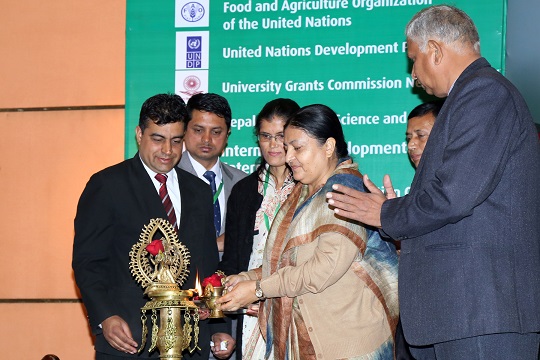Nepal will play proactive role to protect biodiversity and repel negative impact of climate change: President
 Kathmandu / Jan 10: President Bidya Devi Bhandari today said that Nepal wishes to play a proactive role to protect biodiversity and repel the negative impact of climate change.
Kathmandu / Jan 10: President Bidya Devi Bhandari today said that Nepal wishes to play a proactive role to protect biodiversity and repel the negative impact of climate change.
Inaugurating the International Conference on Biodiversity, Climate Change Assessment and Impacts on Livelihood here today, the Head of State said, “The whole world is concerned about the biodiversity loss and looming threats of climate change. Despite resource constraints and globalized nature of climate change impact, Nepal has given priority to address these concerns.”
The President said while Nepal’s contributions to global warming are negligible, it is forced to face the brunt of the negative impact of climate change in the form of ice-melting and threats of glacial lake outburst floods, deforestation, denudation and desertification, loss of precious flora and fauna, drought, landslide and depletion of sources of water, habitat loss and impact on productivity of soil, and consequent migration of people.
“In a way our country represents the world biodiversity in a miniature as Nepal is composed of Himalayas, mountains, valleys and flatlands ranging from the highest point of the world in the Himalayas in the north to plain areas in the southern Terai with exquisite flora and fauna. It is in this context that the conference is undoubtedly more important for Nepal,” the President observed.
Stating that biodiversity is vital for human survival and livelihood, she said in recent years climate change and global warming have emerged as serious challenges threatening biodiversity and disturbing livelihood of common masses.
“While perilous loss of our biodiversity is sure to cause havoc to our fragile ecosystem, predicted impacts are more vulnerable as more people are also likely to face risks of ‘vector borne diseases’. Reckless human activities have already resulted in the loss of biodiversity- a base of life support system. The other critical instance in this respect is possibility of food insecurity in many countries including Nepal,” President Bhandari stated.
Nepal is a party to both Convention on Biological Diversity and the UN Framework Convention on Climate Change, the President said, adding that Nepal has chalked out eco-friendly policy to safeguard forest cover, protected areas and habitat conservation.
Minister for Population and Environment Jayadev Joshi said developing countries like Nepal have been affected the most by the negative impact of climate change which has caused a serious threat to the livelihood.
Stating that the government has formulated and implemented adaptation policy for combating the negative consequences of climate change, he stressed the need of implementing environment-friendly development policy and conducting public awareness programmes at the local level for biodiversity protection.
Tribhuvan University vice-chancellor Prof Dr Tirtha Khaniya, Director General of the International Centre for Integrated Mountain Development (ICIMOD) Dr David Molden, USAID Nepal Director Peter Malnak, Prof Nir Krakauer of City University College of New York, and Chief of the Central Department of Botany Prof Dr Mohan Shivakoti spoke on the significance of the conference, saying it would provide the platform for exchange of ideas and experiences in biodiversity conservation and combating climate change throughout the world.
The conference will run for three days. It is jointly organised by the Ministries of Science and Technology, Population and Environment, Agricultural Development and Forest and Soil Conservation, TU Central Department of Botany, the Agriculture and Forestry University.
The conference brings together around 400 scientists, researchers, professors, environmentalists and conservationists from more than 20 countries including Nepal, India, China, Pakistan, among others. The conference will deliberate on biodiversity issues, climate change and colonising species of plants as well as environmental and mountain problems. Some 300 international research papers will be presented and discussed during the conference, according to Prof Dr Pramod K Jha, the coordinator of the Conference Organising Committee. RSS
